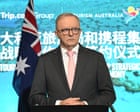
In an era marked by complex international relationships, countries are continuously navigating a delicate balance between diplomatic engagements and strategic autonomy. This week, several developments have underscored the intricacies of such diplomatic endeavors on the global stage, drawing focus to Australia’s strategic decisions, the quest for a peaceful resolution in the Israel-Palestine conflict, and growing concerns over violence in the West Bank.
In an ongoing dialogue about the Indo-Pacific region, Australia has reaffirmed its commitment to a principle of strategic independence. Australian Prime Minister Anthony Albanese has addressed calls from the United States regarding potential military involvement in a hypothetical conflict concerning Taiwan. The defense industry minister, Pat Conroy, clearly stated that Australia will not commit in advance to joining any such conflict. This decision aligns with the country’s view to ensure peace and security within the region while ensuring that such matters are addressed with mindful deliberation. Albanese emphasized the need for regional stability without succumbing to demands for pre-established commitments, thereby reinforcing a desire for strategic autonomy in alliance without compromising peace.
Shifting focus to the Middle East, the push for a two-state solution between Israel and Palestine is gaining momentum and international dialogs continue to unfold. A crucial United Nations summit has been rescheduled for late July, aimed at fostering constructive discussions towards acknowledging a Palestinian state. However, the absence of key figures such as French President Emmanuel Macron may influence the eventual sway of major recognitions expected at the summit. Macron’s efforts underscore a broader European intent to facilitate peace and stability throughout the region. Nonetheless, progress remains entangled in the complex tapestry of ongoing ceasefire negotiations between Hamas and Israel. This development is a reminder of the persistent challenges in achieving a lasting resolution, with many voices continuing to advocate for peaceful coexistence.
Meanwhile, in the West Bank, concerns regarding settler violence have amplified international scrutiny. Four prominent bishops from the Church of England have urged the UK government to apply pressure through sanctions and trade considerations as a response to escalating tensions in the region. They have highlighted a disturbing trend of violence and intimidation against Palestinians, actions they describe as emblematic of state-backed aggression. The bishops’ call for intensified measures reflects a global appeal for accountability and human rights observance, urging the international community to address these issues earnestly and thoughtfully.
As nations contemplate their roles within these profound global issues, the emphasis on peaceful discourse and measured actions highlights the importance of diplomacy in shaping a coherent path forward. These narratives provide a platform for international conversations advocating for strategic stability and peace, emphasizing the shared responsibility of global actors in nurturing a harmonious world order.
The evolving geopolitical landscape calls for continued attention, mindful negotiation, and collaboration, as nations around the globe strive to align their strategies with overarching principles of peace and human dignity.
Source: {link}
